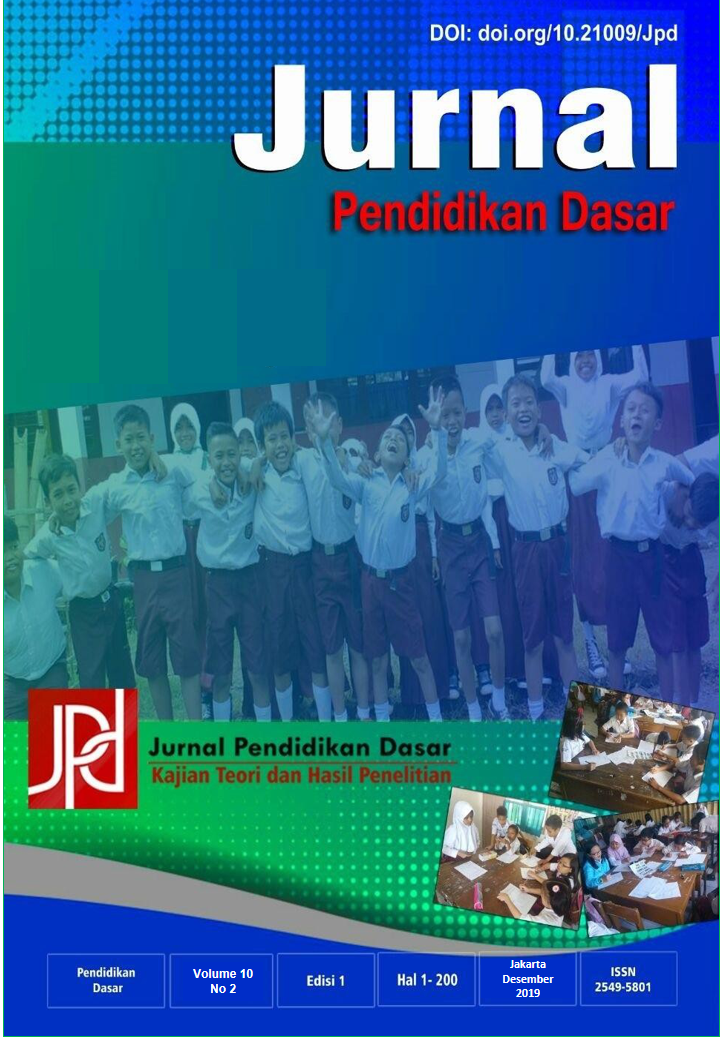PENERAPAN LITERASI SAINS DALAM PEMBELAJARAN IPA UNTUK CALON GURU SD
DOI:
https://doi.org/10.21009/jpd.v10i2.13203Keywords:
literasi sains, Ilmu Pengetahuan Alam, pendidikan abad 21Abstract
Literacy is a complex process, which involves the formation of prior knowledge, culture, and experience to develop new knowledge and deeper understanding. Science literacy is the ability to understand science, communicate science, and apply the ability of science to solve problems. To improve the ability of scientific literacy in addition to requiring student motivation, teachers also need to consider learning strategies that are appropriate to the conditions and potential of students which in the learning process focuses on providing direct experience and the application of the nature of science. Science literacy exists to shape mindsets, behavior, and build human character to care and be responsible for himself, society, and the universe. Literacy learning in schools is carried out to achieve certain goals, but with the development of literacy times it is intended that students are able to achieve certain competencies, so as prospective school teachers who will face 21st century education, 21st century competencies that must be mastered are high-level understanding competencies, competencies critical thinking, collaborative and communicating competencies, and creative thinking competencies. The simulation method is used in the application of scientific literacy using the STL (Science Technology Literacy) method which consists of several stages, namely the contact, curriculum, elaboration, decision making, nexus, and evaluation stages. The results obtained are that the application of the simulation results obtained an average student assessment reached 82.3% with a total of students getting a very good grade of 60% and the rest good at 40%.
References
Arends. (2012). Learning To Teach (Tenth Edit). New York: Mc Graw- Hiil Education.
Daryanto; Karim.Syaiful. (2017). Pembelajaran Abad 21. Yogyakarta: Gava Media.
Hernani; Mudzakir, A. (2010). Pengaruh Pembelajaran Berbasis Literasi Sains dan Teknologi Terhadap Keterampilan Proses Sains Siswa SMP. Jurnal Pendidikan Matematika Dan Sains, 1, 2–4.
Mardapi, D., & Baskoro, E. T. (2010). PENGEMBANGAN PARA DIGMA PENDIDIKAN NASIONAL ABAD XXI. In Laporan BNSP 2010.
Nofiana, M., & Julianto, T. (2018). UPAYA PENINGKATAN LITERASI SAINS SISWA MELALUI PEMBELAJARAN BERBASIS KEUNGGULAN LOKAL. Biosfer : Jurnal Tadris Biologi. https://doi.org/10.24042/biosf.v9i1.2876
Nuraini, N. (2017). Profil keterampilan berpikir kritis mahasiswa calon guru biologi sebagai upaya mempersiapkan generasi abad 21. DIDAKTIKA BIOLOGI: Jurnal Penelitian Pendidikan Biologi. https://doi.org/10.32502/DIKBIO.V1I2.676
Nurdin, N. (2019). Urgensi Literasi Sains Dalam Meningkatkan Kompetensi Widyaiswara PAI BDK Aceh Di Era Millenial. Jurnal Pendidikan Sains Indonesia, 7(1), 55–63. https://doi.org/10.24815/jpsi.v7i1.12476
Nurzarina Amran ; Roslinda Rosli. (2015). KEFAHAMAN GURU TENTANG KEMAHIRAN ABAD KE-21. Universiti Kebangsaan Malaysia. https://doi.org/10.1017/CBO9781107415324.004
P.D, S. (2014). Metode penelitian pendidikan pendekatan kuantitatif.pdf. Metode Penelitian Pendidikan Pendekatan Kuantitatif, Kualitatif Dan R&D.
Permanasari, A. (2010). STEM Education: Inovasi dalam Pembelajaran Sains. In Prosiding Seminar Nasional Pendidikan Sains. https://doi.org/10.1017/S0029665113003923
Permanasari, A. (2016). STEM Education: Inovasi dalam Pembelajaran Sains. Prosiding Seminar Nasional Pendidikan Sains.
Sugiyono. (2012). Metode Penelitian Kuantitatif, Kualitatif dan R & D.Bandung:Alfabeta. Metode Penelitian Kuantitatif, Kualitatif Dan R & D.Bandung:Alfabeta. https://doi.org/10.1017/CBO9781107415324.004
Suharsimi, A. (2018). Dasar-Dasar Evaluasi Pendidikan. In Jakarta: Bumi Aksara (3rd ed.). Jakarta: Bumi Aksara.
Syofyan, H., & Ismail, I. (2018). PEMBELAJARAN INOVATIF DAN INTERAKTIF DALAM PEMBELAJARAN IPA. QARDHUL HASAN: MEDIA PENGABDIAN KEPADA MASYARAKAT, 4(1), 65. https://doi.org/10.30997/qh.v4i1.1189
Syofyan, H., MS, Z., & Sumantri, M. S. (2019). Use of Integrated Thematic Teaching Materials Based on Problem Solving in Natural Science Learning in Elementary Schools. https://doi.org/10.4108/eai.21-11-2018.2282034
Syofyan, H., & Rachmadtullah, R. (2019). Increasing ecoliteracy on the impact of organic waste management using a problem a problem-solving the model. International Journal of Scientific and Technology Research.
Yuliati, Y. (2016). Peningkatan keterampilan proses sains siswa sekolah dasar melalui model pembelajaran berbasis masalah. Jurnal Cakrawala Pendas (Vol. 2). Retrieved from http://jurnal.unma.ac.id/index.php/CP/article/view/335/315
Downloads
Published
How to Cite
Issue
Section
License
Jurnal Pendidikan Dasar





















